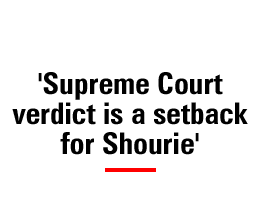 | « Back to article | Print this article |


Fali Nariman, who argued the case against the divestment of HPCL and BPCL, says he is not against divestment but believes the Government of India should have followed the rules before trying to rush through the process.
In an exclusive interview with Chief Correspondent Onkar Singh, the distinguished lawyer said he does not take up cases merely to win. "You take up cases; sometimes you win, sometimes you lose," he said.
Is the Supreme Court verdict in the case of divestment of HPCL and BPCL a personal victory?
I do not know whether it could be called a personal victory. I personally feel there is nothing like victory in these cases. The more important thing is that the Supreme Court decision asking the Government of India to go to Parliament and get its approval before divesting in HPCL and BPCL upholds the true principle of parliamentary democracy.
If we are to function as a parliamentary democracy then whatever comes out of Parliament as an Act, nothing can be done contrary to it unless or until the Act is either amended or repealed. This process has to go through Parliament.
Everything You Want to Know About the Divestment Controversy
What happens if Parliament is not in session?
It does not mean that if Parliament is not in session then the government is helpless. Under our Constitution, unlike other constitutions of the world, there are express law making powers vested in the Executive during a period when Parliament is not in session. The government could bring an ordinance to enact a law and later seek Parliament's approval. By an ordinance the government could have initiated the process of divestment in HPCL and BPCL amending the Nationalization Act.
Will the Supreme Court order have a larger impact? Do you feel the earlier sale of Public Sector Undertakings violated norms?
No, because they were not undertaken by the Nationalization Act. If they were taken over by the Nationalization Act and if at that time they were not challenged, then the court is not going to upset the settled transactions. This is the principle of law -- settled transactions are not unsettled.
Can the government seek a review of the Supreme Court order either through a Presidential reference or approaching a Constitution Bench?
The government has enormous powers. If does not accept the verdict then surely it can seek a Presidential reference or ask the court to refer an allied case -- not the same case -- to a Constitution Bench. But it depends upon the government. If it wants the matter to be referred to the court for reconsideration, then it would do so.
The government said recently that it would seek clarifications from the Supreme Court on the order halting the sale of BPCL and HPCL. What does this mean?
They can seek clarifications but it depends upon the government what kind of clarifications they seek and the Court would respond accordingly.
Will the Oil Sector Officers Association agree to divestment of HPCL and BPCL in case it is approved by Parliament?
Whether the Association accepts it or not the country has to accept it if Parliament okays divestment of the two public sector undertakings. If Parliament passes a law -- unless that law is unconstitutional -- then we have to accept it.
Would you say the Supreme Court judgment is a setback for Divestment Minister Arun Shourie and the manner in which he was trying to push through the process of divestment?
You are right that the judgment is indeed a setback for Arun Shourie and the manner in which he was trying to divest HPCL and BPCL. What has been enacted by a law passed by Parliament the reverse process also has to be approved by Parliament which would pass another law to nullify the earlier law. I am not against divestment but it should be done in accordance with the law.
Design: Uday Kuckian